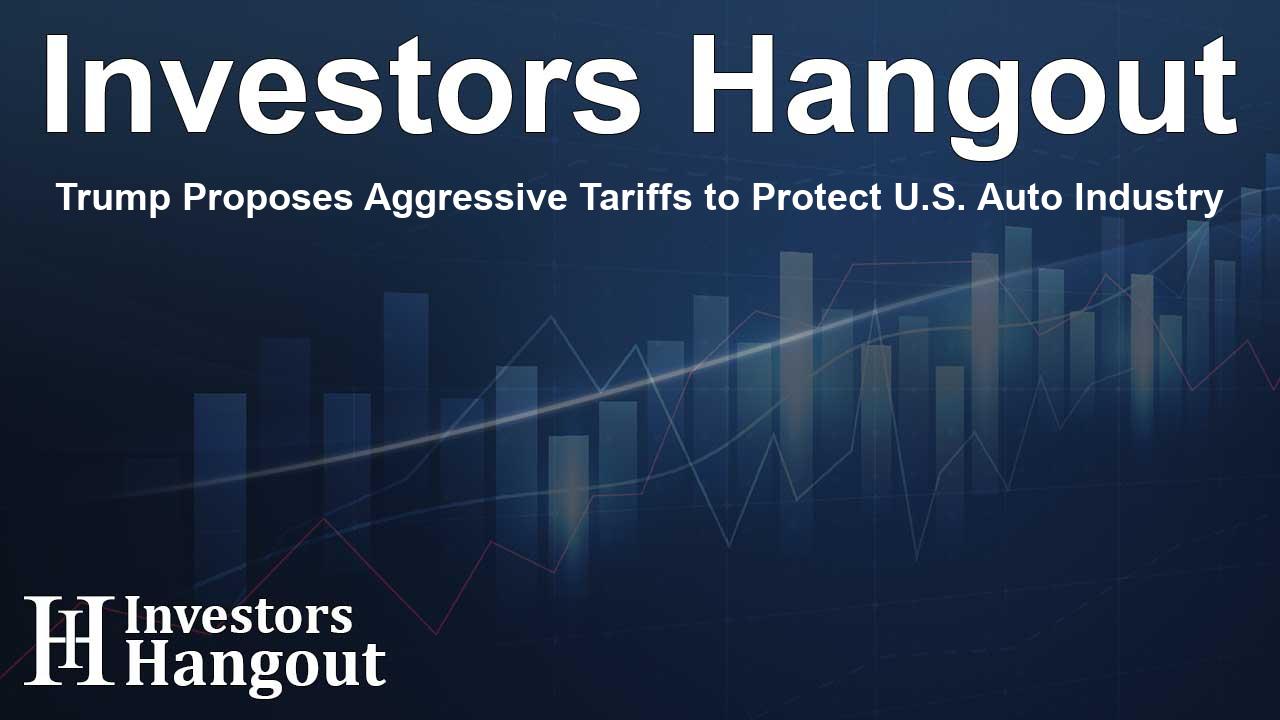Trump Proposes Aggressive Tariffs to Protect U.S. Auto Industry

Trump's Bold Tariff Strategy
As the 2024 presidential election approaches, former President Donald Trump has introduced a provocative trade policy aimed at safeguarding American jobs and the auto industry. His proposal focuses on imposing significant tariffs on vehicles claimed to be produced by Chinese manufacturers in Mexico, a move that has sparked considerable debate.
Details of the Proposal
During a recent town hall gathering in Flint, Michigan, Trump reiterated his assertions regarding the presence of Chinese automakers establishing large factories in Mexico. He mentioned plans to levy a staggering 200% tariff on any vehicles manufactured at these purported facilities headed for the U.S. market. According to him, if Vice President Kamala Harris were to assume office, the U.S. auto industry could face an imminent collapse due to a shift in electric vehicle (EV) production to China.
Future of the U.S. Auto Industry
Trump expressed a dire warning: "If I don't win, you will have no auto industry within two to three years." He highlighted his view that without intervention, China would dominate the manufacturing landscape in the electric vehicle sector.
Industry Responses and Claims
Despite Trump's alarming predictions, recent statistics tell a different story. Since Joe Biden took office in January 2021, the U.S. auto sector has seen a rise in employment, with a notable 13.6% increase, reaching approximately 1.07 million jobs by August.
Assessing the Reality
While Trump asserts that his tariffs will make Chinese-built vehicles unmarketable in the U.S., industry experts have pointed out that no large-scale Chinese auto factories are currently being constructed in Mexico. The only significant facility is a small assembly plant operated by JAC. The Harris campaign has countered Trump's assertions, stating that a second term for him would adversely affect auto jobs and inadvertently benefit China.
The Economic Implications of Tariffs
Trump's proposals regarding tariffs have been recurring themes throughout his campaign. A recent comment from a strategist at Commerzbank AG warned that Trump’s ambitions for "dollar dominance" through 100% tariffs may disturb the global economic equilibrium and weaken the U.S. currency position.
Criticism of Tariff Policies
During a presidential debate, Vice President Harris criticized Trump's tariffs as a "Trump sales tax," suggesting it could impose a substantial burden on middle-class families by driving up prices on everyday goods. In his defense, Trump mentioned a possible increase in tariffs to levels between 60% and 100% on goods from China.
Expert Opinions on Tariffs
Prominent economist Jason Furman, who served under former President Obama, raised concerns regarding the rationale behind high tariffs, emphasizing the potential economic repercussions and the burden of retaliatory tariffs from other nations. Concerns regarding a potential trade war have been echoed by several economists.
Predictions from Economic Leaders
Earlier in the year, Goldman Sachs chief economist Jan Hatzius warned that Trump's envisaged 10% tariffs on all U.S. imports could escalate into a trade war, resulting in drastic shifts in monetary policies and contributing to inflationary pressures across the U.S. economy.
Conclusion
As discussions surrounding tariff policies heat up, the implications for the U.S. auto industry are profound. An understanding of Trump's proposals, responses from the automotive sector, and economic reactions forms a crucial part of the dialogue as the nation heads towards the pivotal 2024 elections.
Frequently Asked Questions
What are Trump's proposed tariffs on Chinese-made vehicles?
Trump plans to impose a 200% tariff on vehicles produced by alleged Chinese factories in Mexico, aiming to protect the U.S. auto industry.
How does Trump's tariff proposal affect the U.S. auto industry?
The tariffs are intended to keep Chinese vehicles out of the U.S. market, which Trump believes will safeguard American jobs and factories.
What evidence contradicts Trump's claims about the auto industry?
Employment in the auto industry has increased by 13.6% since President Biden took office, contradicting Trump's assertions of an impending collapse.
What are the potential economic consequences of these tariffs?
Experts warn that high tariffs could lead to trade wars, price increases for consumers, and adverse effects on the U.S. economy overall.
How have other political figures responded to Trump's tariffs?
Vice President Kamala Harris and other critics have labeled these tariffs as harmful to middle-class families, arguing they could lead to higher prices on everyday goods.
About Investors Hangout
Investors Hangout is a leading online stock forum for financial discussion and learning, offering a wide range of free tools and resources. It draws in traders of all levels, who exchange market knowledge, investigate trading tactics, and keep an eye on industry developments in real time. Featuring financial articles, stock message boards, quotes, charts, company profiles, and live news updates. Through cooperative learning and a wealth of informational resources, it helps users from novices creating their first portfolios to experts honing their techniques. Join Investors Hangout today: https://investorshangout.com/
Disclaimer: The content of this article is solely for general informational purposes only; it does not represent legal, financial, or investment advice. Investors Hangout does not offer financial advice; the author is not a licensed financial advisor. Consult a qualified advisor before making any financial or investment decisions based on this article. The author's interpretation of publicly available data shapes the opinions presented here; as a result, they should not be taken as advice to purchase, sell, or hold any securities mentioned or any other investments. The author does not guarantee the accuracy, completeness, or timeliness of any material, providing it "as is." Information and market conditions may change; past performance is not indicative of future outcomes. If any of the material offered here is inaccurate, please contact us for corrections.